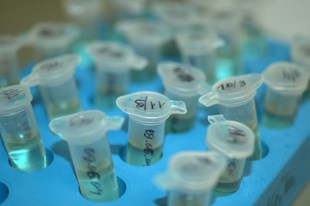Stool DNA Test Fact Sheet
Cancer of the colon is the third most common type of cancer, ranking number two amongst the causes of death from cancer in the United States. Regular screening for colon cancer decreases the number of people who develop cancer of the colon and who die from cancer. A stool DNA test is one of the ways doctors can screen for colon cancer. People can also use the tests at home.
Overview of the Test
The stool DNA test examines fecal matter to detect DNA abnormalities that could be caused by growths called polyps or from cancerous lesions. Specific gene markers indicate possible cancer, and as cells affected by cancer are shed in the colon, these cells with mutations may appear in the stool. Stool DNA tests are available in many areas of the world. Doctors in the US do not use them anymore, but they are still available online and in other countries.
The American Cancer Society endorses these tests. Since 2008, DNA stool tests have been included in the recommendations for colon cancer screening, though the tests are recommended for identifying cancer and not precancerous growths. However, the test can be positive if there are precancerous polyps in a person’s lower intestinal tract.
Evidence and Science behind the Test
Stool DNA test are constantly under development. An article published in the New England Journal of Medicine in 2002 reported studies of a DNA stool test developed by experts at John Hopkins. The test was deemed safe and accurate, but was still a few years away from being available clinically. In 2008, a study conducted by the Mayo Clinic was published in the Annals of Internal Medicine. The results indicated that the stool DNA tests available then had significant limitations. However, the lead researcher said that all the issues with the test were fixable.
The study took place from 2001 to 2007 and included almost 4,500 patients. People between the ages of 50 and 80 were included. It also examined the effectiveness of two fecal blood tests. The DNA stool tests did better than both the fecal tests. One fecal test found one out of six large growths and cancer. The other found one in four. The newest DNA stool test found half of the large polyps and cancers. It also detected almost half of the precancerous polyps compared to only 17 and 10 percent found by the fecal tests. Researchers were encouraged by results and hopeful that the next generation of DNA tests would continue to improve in accuracy and usefulness as a diagnostic tool.
A follow-up study performed the next year discovered that by making some changes to improve the effectiveness of the tests, a new version was able to find around 90 percent of precancerous polyps and cancers. The study was published in Gastroenterology journal.
A commercial DNA stool test that people in the US have access to is known as ColoSure. This is the only one available in the US.
How is it done?
DNA stool testing is a very simple test. People use a kit to get a sample of fecal matter in a container and then pack the sample with an ice pack. The package is sent to a lab. It takes around three to six weeks to receive results. It can be done at home or in a doctor’s office.
Doctors recommend colonoscopies for people who test positive. Colonoscopies are the only way to truly detect lesions and get rid of polyps.
Who does it?
A DNA stool test can be done at a hospital or individuals may collect their own sample at home.
Cost
Most health insurance companies do not cover DNA stool tests, and neither does Medicare. A hospital test or in-home DNA stool test ranges in price between $350 and $800. These tests are cheaper than colonoscopies, which are the most definitive, but invasive, test for colon cancer. The DNA stool tests are more expensive than tests that detect blood in the stool. These fecal blood stool tests may cost around $5 to $25.
When and How Often?
Other fecal tests are recommended every year while more invasive screening tests need only be done every five years. The DNA stool test does not have clear guidelines yet, but every two to five years is a general interval for testing. People who have been identified as higher risk for colon cancer, such as people over age 50 or who have a family history of colon cancer may need more frequent screening.
Issues
Most colon screening tests require people to empty their colon before testing, which can mean modifications to the diet or medications. One of the significant benefits of the DNA stool test is that people do not need to make any changes prior to the test. People can eat, drink and use their medications as they normally would.
References
- National Cancer Institute
- Johns Hopkins Hospital
- FightColorectalCancer.org
- PubMed.gov
- ScienceDaily
- Cancer.org
- Fast Living Slow Ageing; Kate Marie and Christopher Thomas; 2009
Last reviewed 26/Feb/2014
